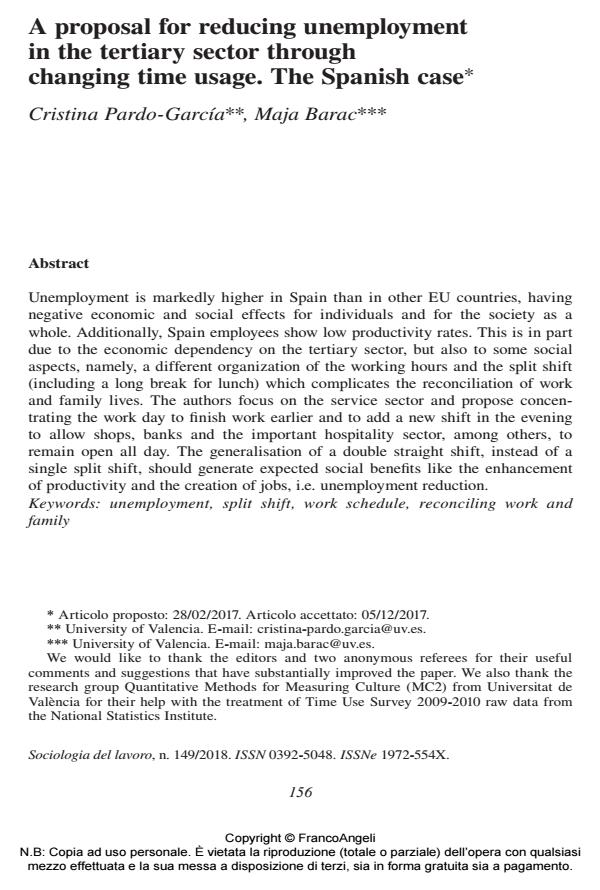A proposal for reducing unemployment in the tertiary sector through changing time usage. The Spanish case
Titolo Rivista SOCIOLOGIA DEL LAVORO
Autori/Curatori Cristina Pardo-García, Maja Barac
Anno di pubblicazione 2018 Fascicolo 2018/149
Lingua Inglese Numero pagine 19 P. 156-174 Dimensione file 164 KB
DOI 10.3280/SL2018-149010
Il DOI è il codice a barre della proprietà intellettuale: per saperne di più
clicca qui
Qui sotto puoi vedere in anteprima la prima pagina di questo articolo.
Se questo articolo ti interessa, lo puoi acquistare (e scaricare in formato pdf) seguendo le facili indicazioni per acquistare il download credit. Acquista Download Credits per scaricare questo Articolo in formato PDF

FrancoAngeli è membro della Publishers International Linking Association, Inc (PILA), associazione indipendente e non profit per facilitare (attraverso i servizi tecnologici implementati da CrossRef.org) l’accesso degli studiosi ai contenuti digitali nelle pubblicazioni professionali e scientifiche.
Unemployment is markedly higher in Spain than in other EU countries, having negative economic and social effects for individuals and for the society as a whole. Additionally, Spain employees show low productivity rates. This is in part due to the economic dependency on the tertiary sector, but also to some social aspects, namely, a different organization of the working hours and the split shift (including a long break for lunch) which complicates the reconciliation of work and family lives. The authors focus on the service sector and propose concentrating the work day to finish work earlier and to add a new shift in the evening to allow shops, banks and the important hospitality sector, among others, to remain open all day. The generalisation of a double straight shift, instead of a single split shift, should generate expected social benefits like the enhancement of productivity and the creation of jobs, i.e. unemployment reduction.
La disoccupazione è nettamente più elevate in Spagna che in altri paesi dell'UE, avente conseguenze economiche e sociali negative per le persone e per la società nel suo complesso. Inoltre, la Spagna i dipendenti mostrano bassi tassi di produttività. Questo è in parte dovuto alla dipendenza economica del terzo settore, ma anche da alcuni aspetti sociali. In sostanza, una diversa organizzazione degli orari di lavoro e l'orario spezzato (con una lunga pausa per il pranzo) che complica conciliare lavoro e vita familiare. Gli autori concentrarsi sul settore dei servizi e di pro-porre di concentrare l'orario di lavoro per terminare prima i lavori e aggiungere un nuovo turno la sera per consentire a negozi, banche e l'importante settore alber-ghiero, tra gli altri, di rimanere aperto durante tutta la giornata. Questo doppio tur-no, invece di l'orario spezzato, potrebbe essere meglio riorganizzata per modificare il fuso orario e il miglioramento della distribuzione di luce solare tra mattina e sera. Gli attesi benefici sociali sono il miglioramento della produttività e creazione di posti di lavoro, cioè alla riduzione della disoccupazione.
Parole chiave:La disoccupazione, orario spezzato, fuso orario, conciliare lavoro e famiglia
Cristina Pardo-García, Maja Barac, A proposal for reducing unemployment in the tertiary sector through changing time usage. The Spanish case in "SOCIOLOGIA DEL LAVORO " 149/2018, pp 156-174, DOI: 10.3280/SL2018-149010